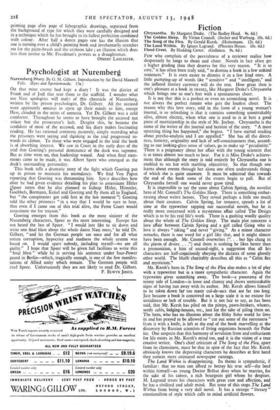Psychologist at Nuremberg
Nuremberg Diary. By G. M. Gilbert. Introduction by Sir David Maxwell
Fyfe. (Eyre and Spottiswoode. . . _ OH that mine enemy had kept a diary ! It was the diaries of Frank and of Jodi that sent them to the scaffold. I wonder what use Nazi apologists *ill make of this chronicle of Nuremberg, written by the prison psychologist, Dr. Gilbert. All the accused were apparently anxious to open up their minds to him, except Hess, clouded in the mists of amnesia. Yet Dr. Gilbert was a cold comforter. Throughout he seems to have brought the accused not solace but the prosecutor's lash. Despite this, he became the confident of most of the accused, and his diary makes fascinating reading. He has rationed comment austerely, simply recording what the prisoners were saying and thinking as the trial progressed to- wards its climax. To those who were engaged in the trial the book is of absorbing interest. We saw in Court in the early days of the trial that Goering's personal dominance of the dock was supreme. But as time went on, that leadership waned. And when final state- ments came to be made, it was Albert Speer who emerged as the dock's outstanding personality.
This book tells a dramatic story Of the fight which Goering put up in prison to maintain his ascendancy. We find Von Papen reporting that Goering was threatening him. Speer describes how after he had given evidence detailing his plan to assassinate Hitler (Speer states that he also planned to kidnap Hitler, Hinimler, Goebbels, Bormann, Keitel and Goering and fly them all to England, but "the conspirators got cold feet at the last moment ") Goering told the other prisoners "in a way that I would be sure to hear, that even if I came out of this trial alive, the Feme Court would assassinate me for treason."
Goering emerges from this book as the most sinister of the Nuremberg characters, Speer as the most interesting. Europe has not heard the last of Speer. "1 would just like to sit down and write one final blast about the whole damn Nazi mess;' he told Dr. Gilbert, "and let the German people see once and for all what rotten corruption, hypocrisy and madness the whole system was based on. I would spare nobody, including myself—we are all guilty." I hope that Speer will be given full facilities to write this "final blast" while he is serving his sentence under four-Power guard in Berlin—which, tragically enough, is one of the few manifes- tations of Allied unity which remain. The German people will read Speer. Unfortunately they are not likely to read Dr. Gilbert.
F. ELWYN JONES.


































 Previous page
Previous page